home / Best Course Platforms /Kajabi Review
We earn a commission from partner links on this site. This doesn’t affect our opinions or evaluations.
Kajabi represents a comprehensive ecosystem designed to empower digital entrepreneurs, seamlessly integrating multiple business tools into a single, powerful platform. Its robust infrastructure encompasses sophisticated course development capabilities, an innovative community engagement system, professional coaching product features, and fully customizable branded mobile applications.
Beyond course creation, Kajabi provides entrepreneurs with a versatile toolkit that includes website building, blog management, sophisticated sales funnel development, and comprehensive email marketing solutions. Though the platform commands a premium price point, it delivers exceptional value by consolidating virtually every critical digital business function into one streamlined environment.
For knowledge entrepreneurs seeking a centralized, all-encompassing business management solution, Kajabi emerges as a compelling and strategic investment in 2025.
Kajabi stands as the leading comprehensive online course platform dominating the digital education marketplace in 2025. Its robust suite of tools empowers entrepreneurs to build and expand their knowledge-based businesses with unprecedented ease.
But is this platform truly the ideal match for your unique needs? What distinctive capabilities does it bring to the table, and how does it stack up against alternative course creation solutions? Is an integrated platform even necessary for your specific business model?
To provide clarity and guide your decision-making process, we’ve crafted this comprehensive Kajabi evaluation. Our analysis will thoroughly explore the platform’s feature set, meticulously examining the advantages and potential limitations of its ecosystem.
Drawing from our extensive experience supporting hundreds of content creators in launching successful courses and membership programs on Kajabi, we’ll share insider perspectives that go beyond surface-level insights.
Let’s dive deep into the details.
In the digital education landscape of 2025, Kajabi has established itself as the premier platform for entrepreneurs looking to build and manage their online course and membership site businesses. Its widespread adoption is evident through its impressive user base, which includes renowned industry experts like Amy Porterfield and Brendan Burchard.
The platform empowers creators with comprehensive tools to host, deliver, and monetize online educational programs with professional-grade precision. Kajabi goes beyond course hosting, offering a complete business ecosystem that enables users to construct full-featured websites, maintain engaging blogs, design strategic marketing funnels, and implement sophisticated email marketing automation.

Kajabi’s core philosophy revolves around providing entrepreneurs with a comprehensive, unified solution that eliminates the complexity of managing multiple disparate tools. By consolidating all essential business functions into one intuitive platform, creators can focus on delivering exceptional content without getting bogged down by technical integration challenges.
If you choose a common online course software, you’ll need tools like WordPress for your blog, ClickFunnels for funnels and landing pages, and ConvertKit for managing your email marketing.
Kajabi’s complete features
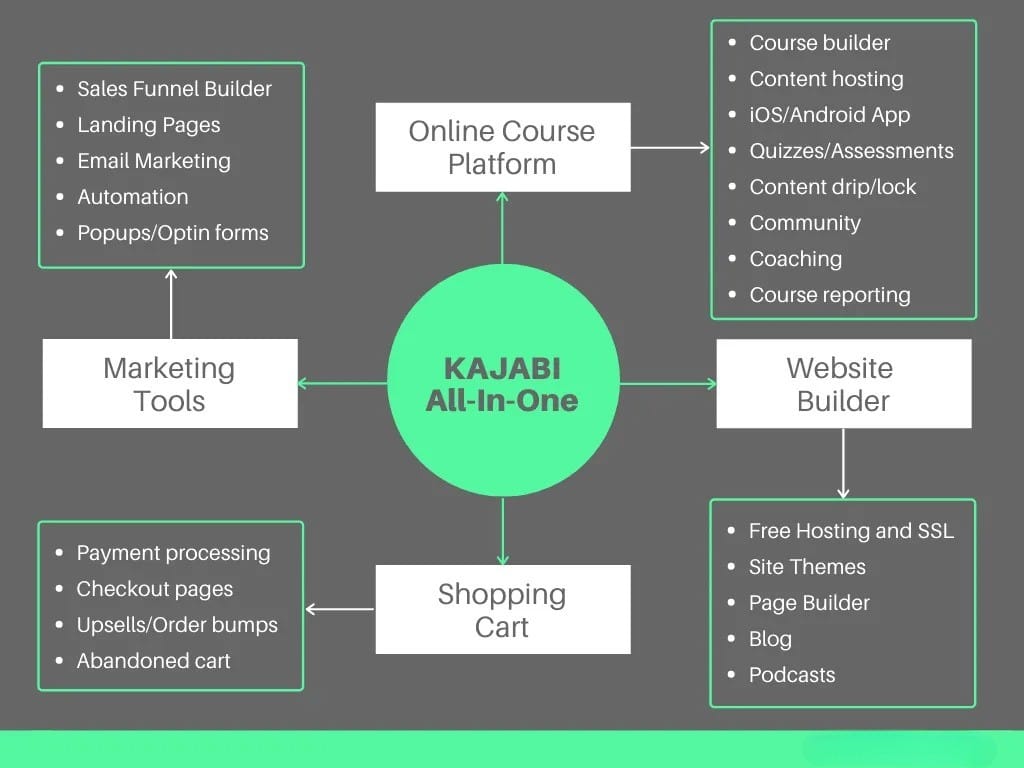
Kajabi is a hosted platform, which means their team handles all the technical aspects like security, maintenance, and platform updates.
It’s also important to note that Kajabi is not a marketplace like Udemy, so you have full control over your course pricing, policies, and student information.
We will examine all the features and review them in the upcoming chapters of this Kajabi guide.
When starting to use a new platform, you might wonder, “What do I need to know?”
With Kajabi, no special skills are required. You just need to learn about the features, where they are, and how they work together.
The user interface is simple and easy to navigate. You can find all the features in the menu on the left side.
Kajabi has organized its features into clear categories. For example, Courses, Coaching, Community, and Podcasts are all listed under the Products tab.

Kajabi has a simple design and easy navigation
When you choose a tool from the left panel, the options and settings show up on the right. The best part is that the UI stays the same across the app.
Additionally, all Kajabi tools (like the course builder and website builder) are drag-and-drop. You can use them easily, even if you’ve never used a similar tool before.
A simple guide to using Kajabi’s interface
To illustrate how this works, consider Kajabi’s standalone tools for creating landing pages, managing email marketing, and processing checkouts. While each component functions independently, they’re all conveniently accessible through a unified interface within the funnel builder.
Despite its comprehensive feature set, Kajabi remains surprisingly intuitive and user-friendly, making it accessible even for beginners.
This segment examines how Kajabi handles course organization, content presentation, educational features, and student interaction.
Let’s begin by exploring the steps for building a course within Kajabi.
Kajabi offers an intuitive drag-and-drop course builder that simplifies the process of incorporating modules and lessons into your course and sequencing them according to your preferences.
Modules serve as organizational containers, while lessons house the actual educational material. For additional structure, you can also include submodules, providing excellent flexibility in how you arrange your Kajabi courses.

Within the course builder, Kajabi now features an innovative AI outline generator. This tool helps you rapidly develop a curriculum framework that you can directly implement into your course structure.
When it comes to hosting capabilities, Kajabi provides unlimited storage for all your materials, including video content. A particularly valuable feature is the ability to utilize these assets throughout the platform, from educational modules to marketing pages.
The content upload process is remarkably user-friendly. You can easily transfer files from your computer or cloud storage services like Dropbox and Google Drive.
Perhaps most convenient of all, Kajabi’s bulk upload functionality allows you to import multiple videos simultaneously, with the platform automatically converting each one into individual lessons.
Kajabi’s multiple file upload capability
After batch importing, you can enhance and customize each lesson by simply selecting its title to access the editing interface.
Each Kajabi lesson centers around a core content format—video presentations, audio recordings, or knowledge assessments. Beyond this primary element, you can incorporate written explanations, integrate media from external sources, or provide downloadable PDF resources.

The main constraint worth noting is that Kajabi restricts combining multiple content formats within individual lessons. For instance, you cannot include two video segments or pair a video with an assessment in a single lesson.
Setting aside this limitation, the overall course development and material uploading experience in Kajabi remains straightforward and user-friendly, making it accessible even for complete beginners with no technical expertise.
Implementing effective student assessment and interaction tools can significantly enhance course completion statistics and improve student retention rates. Let’s examine the engagement features Kajabi provides.
Kajabi includes a comprehensive assessment system for integrating quizzes and assignments throughout your educational content.
You have the ability to establish minimum passing thresholds for your assessments, with Kajabi handling the scoring process automatically.
For question creation, Kajabi supports these fundamental question formats:
All assessment questions are text-based with the option to enhance them using images for both questions and answer choices, providing sufficient functionality for most course creators.


This assessment functionality also enables you to develop comprehensive assignments. The short answer and file upload question formats are particularly effective for these more complex assessment types.
Additionally, Kajabi incorporates instructor-based evaluation. When participants submit their work, you can personally review their responses and provide appropriate scoring, offering valuable flexibility for education providers.
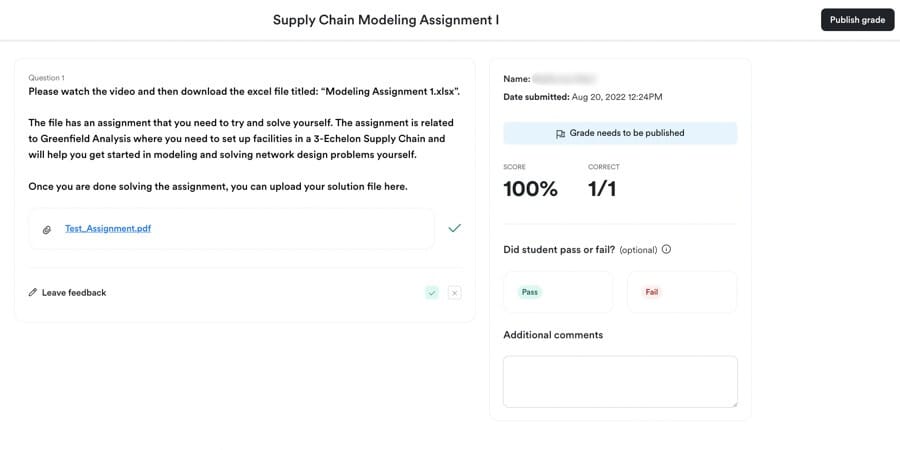
Despite Kajabi’s robust assessment capabilities, several constraints are worth noting:
In terms of achievement recognition, Kajabi enables you to design and distribute course completion certificates to your learners.
Certificate functionality can be activated at the individual course level, with options to personalize the certificate heading and course title. You can also display completion dates and unique certificate identification numbers.

The main limitation is that only a single certificate template is available, though you can enhance its appearance by incorporating a custom background image.
Kajabi’s integrated streaming capability enables you to deliver real-time instruction within your courses without relying on external platforms like Zoom. This proves invaluable for conducting interactive lessons, facilitating group coaching sessions, and hosting question-and-answer meetings.
With this live class functionality, you can establish recurring session schedules or spontaneously initiate broadcasts as needed. Each livestream can support an audience of up to 200 participants, providing substantial capacity for most educational scenarios.
This feature includes essential presentation tools like screen sharing, participant breakout rooms, and audience chat functionality. Additionally, you can capture these sessions for later viewing, giving students flexibility to revisit the material at their convenience.

This comprehensive streaming solution excels at fostering dynamic learning environments and is perfectly suited for running structured group-based programs.
Kajabi’s scheduled release functionality allows you to gradually unveil course modules based on specific timeframes following student registration.
You can configure content availability either relative to individual enrollment dates or according to fixed calendar dates. The system also supports automated notification emails when new content becomes available.
Another valuable capability within Kajabi is its progress-based access control.
This feature enables you to establish sequential learning pathways, requiring students to successfully complete current material before gaining entry to subsequent educational segments.

Assessment-based progression control exists as a specialized implementation of this feature. When activated, this mechanism prevents access to all following educational materials until the student successfully completes the assessment with a passing score.
These scheduled release and progression control capabilities represent significant advantages within Kajabi’s platform, playing crucial roles in maintaining learning discipline and enhancing student participation.
Beyond the standard lesson discussion functionality, Kajabi provides a comprehensive social learning environment through its dedicated community platform.
Kajabi Communities incorporates all fundamental social engagement tools, including multimedia discussion threads, scheduled live events, structured learning challenges, group conversations, private messaging, and achievement recognition systems.
Participants can initiate new conversations or contribute to existing discussions directly from the community homepage while remaining within your educational ecosystem. The system automatically delivers updates through email and browser notifications.
Creating a community space requires minimal technical effort, and the interface features a sleek, contemporary design that functions beautifully without customization.
As the community manager, you can establish specialized interest groups to maintain organizational clarity. You can also implement membership restrictions based on course enrollment or purchase history.
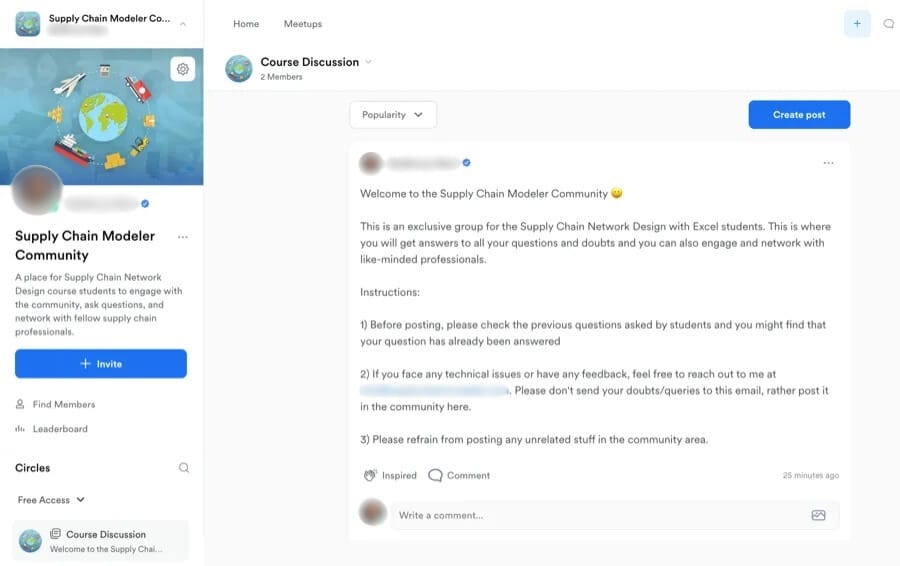
From a functionality perspective, Kajabi Communities stands nearly equivalent to dedicated community management platforms. This versatility makes it suitable for creating course support networks, subscription-based learning communities, and even independent social learning spaces.
Kajabi Coaching provides comprehensive tools for developing, marketing, and administering individual mentorship and group coaching programs.
Establishing a coaching offering involves a straightforward process. You’ll need to input essential information, including session allocation, within your coaching package configuration. Group coaching additionally requires specifying a collective identifier.
Following this, you’ll need to determine your availability parameters. While Kajabi offers built-in functionality for appointment booking and virtual meetings, integration with external scheduling services remains an available option.

Kajabi empowers you to incorporate a comprehensive schedule and supporting materials for each coaching interaction. Coaches and clients can seamlessly collaborate by maintaining both private and shared session notes.
Kajabi emerges as an exceptional platform for delivering professional coaching services. The flexibility allows you to implement independent coaching programs or strategically integrate them with your existing course and membership offerings.
These scenarios represent merely a glimpse into the potential of Kajabi Automations, with virtually limitless innovative implementation strategies available.
The course player represents the primary interaction space for your students, making an exceptional learning interface absolutely critical.
Kajabi provides four distinctively designed course player configurations. The remarkable advantage lies in your ability to select different templates for varying product types. Whether you’re crafting a comprehensive flagship course or managing a dynamic membership site, you’ll discover perfectly matched template options.
Furthermore, extensive customization capabilities enable you to infuse your online program with a distinctive personality, ensuring your educational content stands distinctively apart from conventional offerings.
Visual Exploration of Kajabi’s Course Player Interface Options
We’ve identified the Premier template as our top recommendation, representing the most sophisticated design across multiple online course platforms. This meticulously crafted template offers a refined aesthetic that elevates your educational content, seamlessly integrating lesson thumbnails and personalized branding elements to create a truly professional learning environment.
The lesson page layout of the Premier template exemplifies thoughtful user experience design. With the primary video prominently positioned at the top of the screen, accompanied by a conveniently placed playlist on the right-hand side, learners enjoy an intuitive navigation experience. Supplementary content and interactive comment sections are strategically positioned below the video player, encouraging engagement and deeper learning interaction.
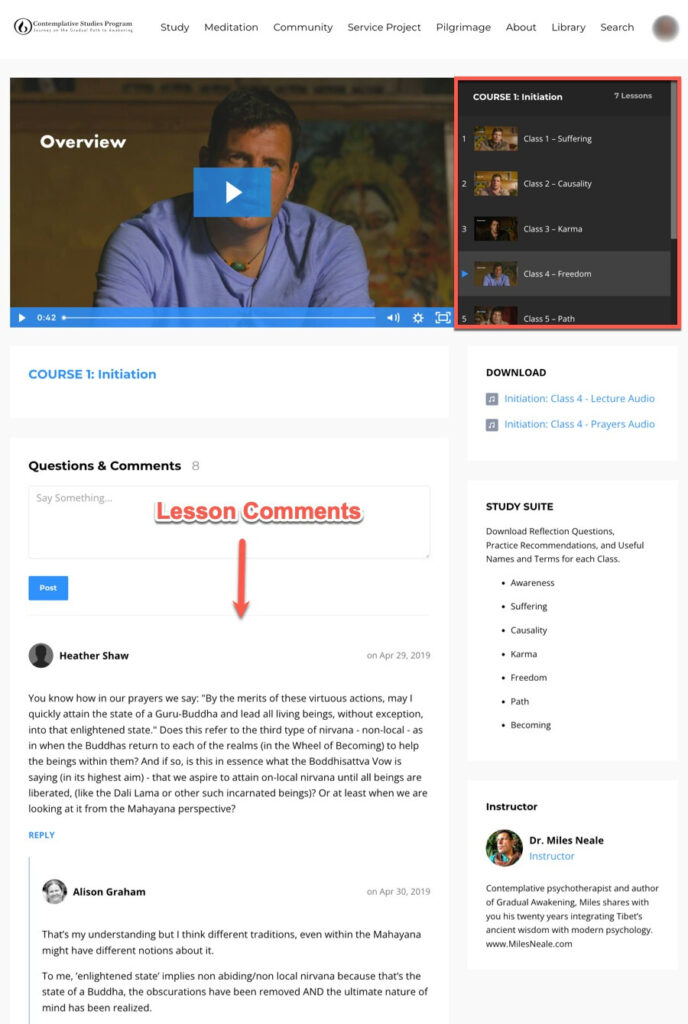
Another compelling course player template in our repertoire is the Momentum design. This template embraces a more classic layout approach, featuring a strategically positioned navigation panel on the left side of the screen, with comprehensive course content elegantly displayed on the right. Its structured layout provides a familiar and intuitive learning experience for students accustomed to traditional educational interfaces.

For creators seeking ultimate flexibility, Kajabi provides multiple pathways when standard templates fall short. You can explore custom templates available in the Kajabi marketplace or leverage advanced customization by implementing your own unique code design.
The platform’s mobile experience is equally impressive. Every course player template is fully responsive, ensuring seamless content consumption across various device sizes. Students can effortlessly engage with your educational materials without encountering display or functionality challenges.
Moreover, Kajabi extends its mobile accessibility through comprehensive iOS and Android mobile applications. These dedicated apps empower learners to access course content wherever they are, transforming any moment into a potential learning opportunity.
An innovative engagement feature allows you to dispatch push notifications directly to users’ devices. Whether announcing fresh content availability or highlighting active discussions, these timely alerts significantly boost student interaction and participation.

A current limitation exists where users cannot access community features through the primary Kajabi app. Instead, they must navigate to a separate Kajabi Communities app, creating a fragmented user experience that falls short of optimal design.
However, Kajabi elevates the mobile strategy by offering fully customized branded applications. This comprehensive solution involves Kajabi professionally developing and maintaining dedicated apps tailored to your specific educational ecosystem.
These branded applications represent a significant advancement, seamlessly integrating both course content and community platforms into a unified mobile experience. Advanced capabilities include integrated in-app purchase functionality and streamlined new member registration processes, positioning these apps as a substantial improvement over standard mobile offerings.
Furthermore, Kajabi distinguishes itself with innovative offerings such as versatile course player templates, complimentary and branded mobile applications, a robust community-building infrastructure, integrated coaching programs, and sophisticated automation tools. This holistic approach ensures suitability across diverse digital product formats – from online courses and membership sites to professional coaching programs.
Establishing a compelling digital presence is fundamental to the success of your online course enterprise, and top-tier online course platforms must provide intuitive website-building capabilities.
Before exploring the core tools, let’s highlight the foundational website features Kajabi delivers:
Now, let’s dive into Kajabi’s website creation capabilities.
Kajabi’s website construction toolkit provides pre-designed themes that can be instantly deployed with a single click. These website themes enable creators to rapidly develop visually appealing and professional digital platforms.
The platform boasts over 10 distinctive themes, each characterized by a sleek and contemporary design aesthetic. These themes offer remarkable versatility, empowering you to construct virtually any type of website with elegance and ease.

After selecting a theme, you’ll have extensive customization capabilities through the page builder, allowing you to meticulously craft your website’s unique visual identity and functional layout.
Additionally, you can explore advanced theme customization options. The platform provides flexibility to acquire themes from the Kajabi marketplace or engage a developer to create a fully bespoke theme tailored to your specific requirements.
Kajabi’s page builder serves as the primary tool for website customization and page creation. This visual, drag-and-drop editor enables real-time modifications directly on your website’s front-end interface.
The page builder boasts an exceptionally intuitive and meticulously designed user experience. Your page’s existing sections are conveniently displayed on the left panel, while a dynamic, instantaneous preview renders on the right, providing immediate visual feedback as you make design adjustments.
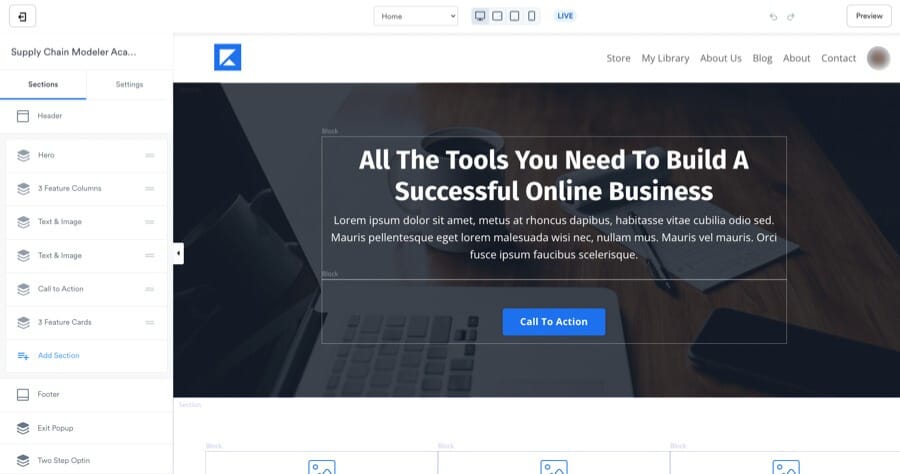
Through the Settings panel, you can fine-tune page-level design elements, including color schemes, typography, font sizes, and other critical visual parameters.
A Kajabi page is architecturally composed of Blocks and Sections. Blocks represent individual elements such as text, images, videos, buttons, and other interactive components, while sections are created by combining multiple blocks into cohesive layouts.
Although you have the flexibility to construct page sections from the ground up, Kajabi simplifies the process by providing over 40 pre-designed section templates. These versatile templates cater to a wide range of design needs and purposes. For instance, you can seamlessly integrate:

Kajabi provides exceptional design flexibility, empowering users to extensively customize section layouts. You can effortlessly add new blocks, dynamically rearrange their positioning, modify their order, and implement comprehensive configuration settings.
Each individual block offers a rich array of customization options, including advanced text editing, color palette modifications, engaging animation effects, and numerous additional styling capabilities. This level of granular control ensures you can create a truly unique and personalized digital experience that perfectly reflects your brand’s visual identity.
Kajabi’s Dynamic Section Layout Customization
Kajabi’s page builder guarantees complete mobile responsiveness across your entire website. Additionally, you gain granular control to selectively display or conceal specific page elements based on device type – desktop or mobile.
The standout feature of Kajabi’s page builder is its remarkable design flexibility. The platform strikes an exceptional balance, offering extensive editing capabilities while maintaining an intuitive, user-friendly interface.
You have the power to comprehensively customize existing pages or construct entirely new designs from the ground up. Remarkably, all of this can be accomplished without requiring any coding expertise whatsoever.
To explore the full spectrum of website creation possibilities on this platform, we recommend reviewing our comprehensive compilation of Kajabi website examples.
Kajabi enables seamless blog integration into your website. The platform provides an intuitive text editor that simplifies the process of creating and publishing new blog posts with exceptional ease.
Beyond content creation, you can enhance your blog entries by incorporating featured images or videos, implement strategic SEO configurations, and organize content through categorical tagging.

Kajabi provides comprehensive blog design capabilities, allowing you to craft both blog homepage and individual post pages using the intuitive page builder. You can also personalize the sidebar and strategically integrate opt-in forms to maximize audience engagement.
While Kajabi enables the creation of a fully functional blog, it does present some limitations compared to dedicated blogging platforms like WordPress. The platform offers fewer customization options in terms of functionality, SEO configuration, and content editing depth.
However, this streamlined approach actually benefits most course creators. By maintaining your blog within Kajabi, you consolidate your entire digital ecosystem into a single, cohesive platform. This integration significantly simplifies content management, reduces technical complexity, and provides a more unified experience for both creators and audience members.

Beyond traditional blogging, Kajabi offers robust podcast production capabilities. The platform provides a comprehensive Podcast feature enabling creators to craft episodes, securely host audio content, and seamlessly distribute to premier listening platforms including Apple Podcasts, Google Podcasts, and Spotify.
Creators have flexible publishing options: launch a complimentary podcast accessible to all audiences, or develop a premium private podcast that can be bundled alongside your online courses and membership site offerings.
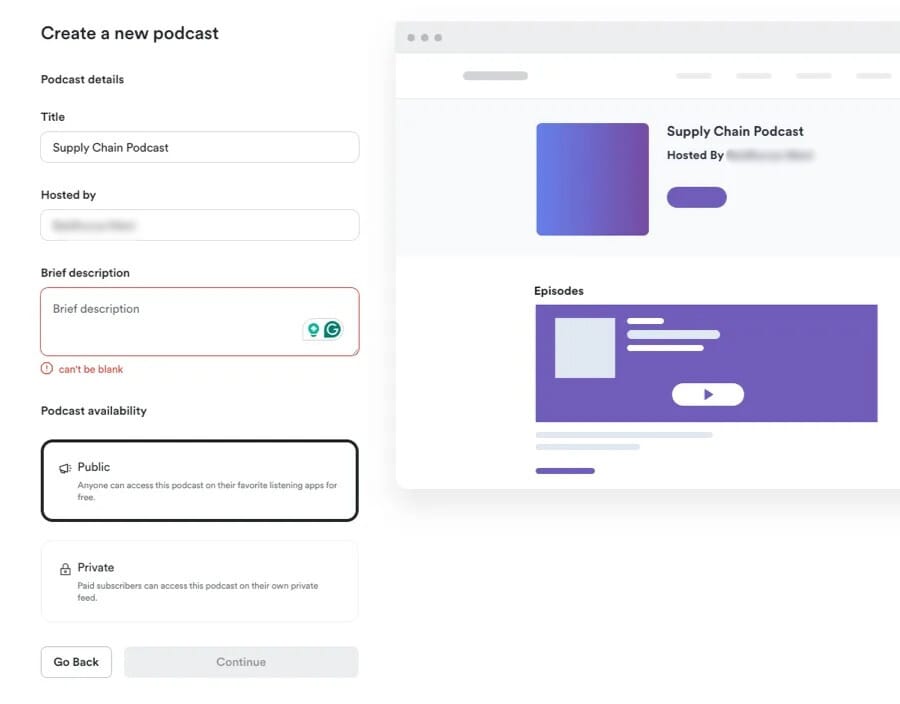
Kajabi Podcasts emerges as a distinctive feature, setting the platform apart as a potentially unique offering among course creation ecosystems.
Unlike typical course platforms that provide basic selling mechanisms, Kajabi delivers a comprehensive marketing ecosystem designed to help creators attract, engage, and monetize their audience within a single integrated platform.
Let’s explore Kajabi’s innovative sales and marketing capabilities.
Within Kajabi’s framework, you’ll craft what the platform terms an Offer. These offers provide remarkable pricing versatility and are remarkably straightforward to configure.
Creators enjoy unprecedented flexibility in product monetization: you can distribute courses at no cost, implement single-purchase models, establish subscription structures, design flexible payment arrangements, or even enable a pay-what-you-want approach.
For recurring subscriptions or structured payment plans, you can bill learners on a weekly, monthly, or annual basis. The platform additionally supports advanced pricing strategies, including initial setup charges and optional trial periods.

Kajabi provides robust global pricing capabilities, enabling creators to set prices in all major international currencies, including USD, GBP, CAD, AUD, INR, and numerous additional options.
Creators can strategically curate product access by selecting specific content types (courses, coaching programs, community spaces, and podcasts) for each offer. This functionality proves especially powerful when leveraging Kajabi as a membership platform.
The platform allows you to include identical products across multiple offers, facilitating the creation of sophisticated tiered membership or course structures.
Beyond basic pricing, Kajabi offers granular control with additional configuration options:
A standout feature is Kajabi’s comprehensive coupon management system. Creators can generate individual discount codes or bulk produce multiple codes, with the flexibility to apply these promotions to specific courses or product offerings.

We’re thoroughly impressed by Kajabi’s sophisticated pricing ecosystem, offering unprecedented flexibility for product monetization strategies.
Kajabi introduces a sophisticated payment solution called Kajabi Payments, powered by Stripe and delivering a comprehensive suite of payment methods. The platform supports diverse payment options including Apple Pay, Google Pay, and flexible buy now, pay later arrangements.
The system can automatically handle sales tax calculations and collection, simplifying financial management for creators, though users remain responsible for final tax filing and remittance.
Furthermore, Kajabi provides seamless integration with Stripe and PayPal, eliminating additional gateway fees. Payments are instantaneously transferred directly to your designated accounts.
Notably, PayPal integration extends to subscription models and payment plans, with robust support for international pricing beyond USD currencies.

A critical component of course sales revolves around the checkout experience, and Kajabi excels in this crucial area.
Kajabi’s checkout page delivers a streamlined, conversion-focused design featuring a single-step purchasing process. Potential customers complete their transaction first, with account creation following seamlessly afterward.
The platform’s powerful page builder enables extensive checkout page personalization. Creators can strategically enhance their checkout experience by incorporating elements like company logos, introductory videos, detailed offer specifications, compelling customer testimonials, and reassuring money-back guarantee badges.

Creators enjoy comprehensive customization of customer information collection, with the flexibility to request additional details like addresses and phone numbers.
Beyond the full-page checkout, Kajabi introduces a convenient popup checkout option, allowing customers to complete purchases without navigating away from their current page.
A distinctive feature enables users to purchase multiple units of the same offer in a single transaction, perfectly suited for group course enrollments or event registrations.
Kajabi amplifies conversion potential through several advanced marketing tools:
Kajabi delivers a comprehensive suite of features designed to optimize online course sales and checkout experiences.
Kajabi Funnels represents the most intuitive and rapid funnel-building solution for creators with minimal marketing expertise, positioning it among the top sales funnel software available.
When initiating a sales funnel (pipeline), users can select from an extensive library of pre-configured templates.
Creators can choose a Freebie template for lead magnet generation, opt for the Zoom Webinar OVO to develop webinar content, or utilize a blank template for completely custom funnel construction.

Upon selecting a template, Kajabi instantaneously assembles a comprehensive funnel ecosystem, seamlessly integrating landing pages, registration forms, email campaigns, and your specific offer.
Take the webinar template as a prime example: Kajabi automatically generates the entire event infrastructure, including the registration page, confirmation page, event details, and a strategic sequence of reminder and follow-up emails.

Let’s explore the nuanced process of personalizing your sales pipeline.
Kajabi provides an intuitive editing experience, allowing you to modify the pre-generated placeholder content for landing pages and emails with remarkable ease. Simply clicking on a page instantly activates the page builder within the pipeline workspace, enabling immediate and comprehensive customizations.
Creators can design their entire funnel without ever exiting the pipeline builder, delivering an extraordinarily streamlined and user-friendly experience.
Kajabi Funnels Supports Seamless Inline Editing
Beyond constructing comprehensive funnels within Kajabi, creators can also develop independent landing pages for lead generation, course sales, and various marketing objectives.
Users gain access to an extensive library featuring over 40 professionally designed landing page templates. These templates offer both aesthetic appeal and remarkable customization potential through Kajabi’s intuitive page builder.

You can craft strategic email capture forms that seamlessly integrate into your blog posts or appear as engaging popups to gather potential customer contact information.
Moreover, Kajabi empowers you with innovative lead generation through its Assessment feature, enabling you to design interactive marketing quizzes that not only capture leads but also intelligently segment your target audience.
Kajabi revolutionizes marketing funnel creation in 2025, standing uniquely apart as the most comprehensive online course platform with unparalleled funnel-building capabilities.
Kajabi transcends traditional email communication, offering a sophisticated marketing ecosystem far beyond standard notifications or broadcast messaging.
The platform enables you to design intelligent email automation sequences dynamically triggered by specific user interactions and behaviors.
Crafting an email becomes a breeze with Kajabi’s extensive template library and intuitive drag-and-drop editor. You can select from dozens of professionally designed templates and customize them with precision to match your brand’s unique voice.
Flexibility is key—you can construct multi-stage email campaigns with unlimited emails, strategically scheduling intervals between each communication to optimize engagement and conversion.

The platform provides robust user categorization and segmentation capabilities, enabling you to manage your audience with unprecedented precision and craft highly targeted email marketing strategies.
The pinnacle of Kajabi’s marketing power lies in its comprehensive Automation features. This sophisticated system empowers you to create intricate, intelligent email workflows that respond dynamically to user behaviors and interactions.
Imagine the possibilities: automatically removing subscribers from a sales sequence the moment they complete a purchase, or strategically redirecting them to alternative email campaigns if they haven’t converted. The level of marketing automation is truly transformative.
You can also leverage these automations to extend personalized incentives, such as generating single-use discount coupons for new subscribers to encourage course enrollment. Additionally, the platform supports innovative engagement options like a “gift this course” feature, expanding your marketing flexibility.
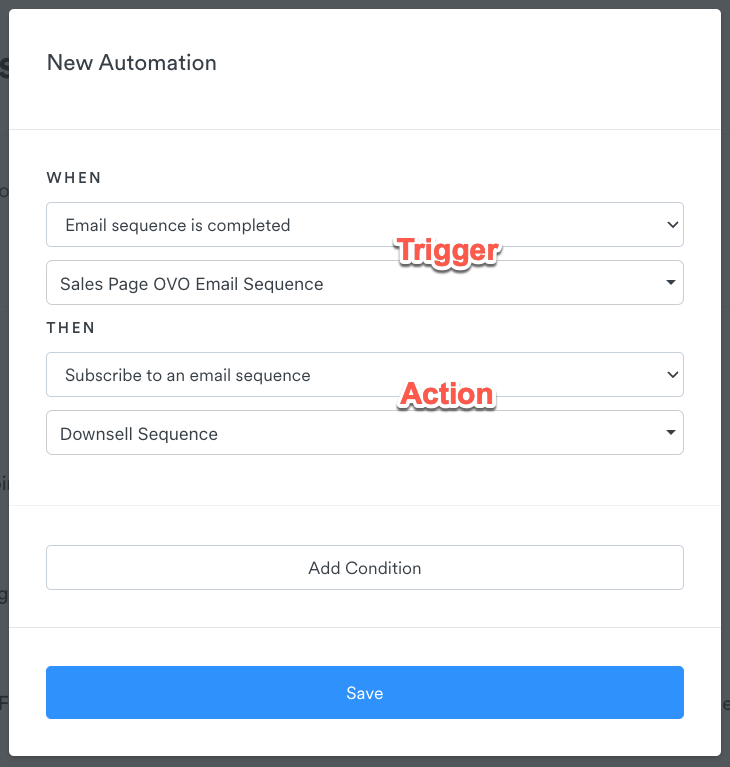
The platform’s sole limitation is the absence of a comprehensive visual automation workflow builder. Despite this minor drawback, Kajabi’s automation capabilities remain impressively robust, unlocking extraordinary marketing potential in 2025.
Many marketing automation strategies become challenging or impossible when using separate email providers alongside your course platform, highlighting Kajabi’s integrated approach.
Kajabi has integrated several powerful AI tools to streamline content creation:
Kajabi provides a full-featured ecosystem for establishing and managing affiliate programs with remarkable flexibility. You can strategically select which offers to open for affiliate promotion and configure commission rates with precision.
The platform allows granular control, including the ability to customize commission rates for individual affiliates. Through the intuitive admin dashboard, you can comprehensively track affiliate performance, monitoring metrics like form submissions and conversion rates, and effortlessly export detailed payout reports.
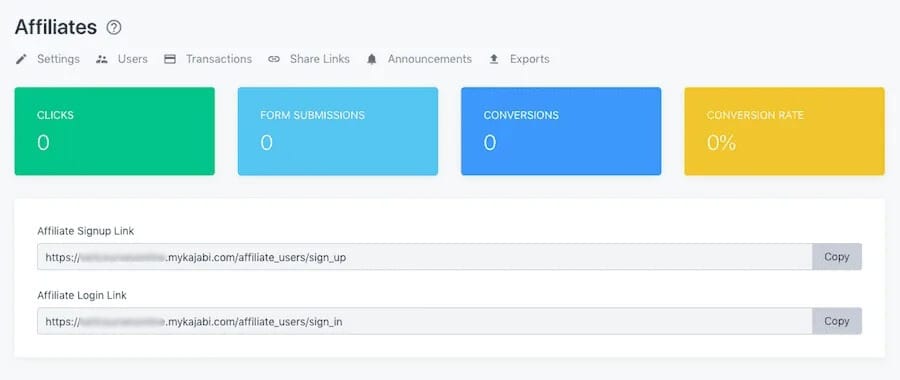
Beyond standard cookie-based tracking, Kajabi empowers you to generate personalized coupon codes that serve as precise conversion tracking mechanisms for your affiliate network.
The platform automatically provisions comprehensive registration and login pages for your affiliates, complemented by a secure private dashboard. This dedicated space allows affiliates to access their unique promotional links and monitor real-time performance statistics for their marketing efforts.

The primary limitation in Kajabi’s affiliate system is the current inability to upload promotional assets or swipe files for affiliates. Despite this minor shortcoming, the platform’s affiliate tools receive an enthusiastic endorsement.
It provides unparalleled flexibility with customizable pricing structures, advanced checkout capabilities, robust affiliate marketing tools, and seamless native tax management. Beyond these essentials, Kajabi elevates your marketing strategy with cutting-edge tools like its sophisticated funnel builder and intelligent email automation systems.
Understanding your business performance is crucial for continuous improvement, and comprehensive reporting plays a pivotal role in this process. Kajabi recognizes this need and provides an extensive suite of analytical tools to empower course creators.
Kajabi delivers a sophisticated reporting infrastructure designed to provide deep insights into your online course business. The platform features a dedicated Analytics section within the admin dashboard, offering comprehensive reports that track critical metrics including page views, conversion rates, revenue generation, and affiliate sales performance.

The platform provides an in-depth subscription analytics report that unveils critical metrics such as monthly recurring revenue and churn rate. This feature proves especially valuable for entrepreneurs looking to develop a robust Kajabi membership site in 2025.
The individual reports boast an exceptional level of organizational clarity. Take the Net Revenue report, for instance, which presents a comprehensive view through a detailed revenue chart, alongside a nuanced summary breaking down revenue and refunds for each specific offer.

The reporting interface offers remarkable flexibility, allowing you to dynamically filter reports by specific dates or individual offers. Users can effortlessly toggle between daily, weekly, monthly, and yearly views to gain comprehensive insights into their business performance.
For course-specific tracking, Kajabi provides robust student progress monitoring capabilities. With a simple click, you can drill down into individual student profiles, accessing detailed insights including lesson completion status and quiz performance metrics.

Kajabi’s video analytics provide a comprehensive suite of insights, offering detailed metrics such as engagement rates and play rates. The platform’s advanced visual engagement viewer and innovative video heatmaps empower creators to deeply understand student interaction patterns, precisely identifying where viewer attention peaks and where potential drop-off points occur.

The platform provides dedicated email campaign reporting, offering deep insights into campaign performance. You can access detailed metrics including open rates, click-through rates, net revenue, and additional critical indicators for each email dispatch.
Kajabi’s admin area features a specialized People section designed for comprehensive user administration. The platform offers powerful user management capabilities that streamline your audience interaction.
You can efficiently import users in bulk, with the flexibility to simultaneously grant access to specific offers or apply targeted user tags. Managing your existing user base becomes remarkably intuitive with Kajabi’s extensive filtering options.
The system provides a sophisticated array of filtering capabilities, enabling you to segment users with incredible precision. Filter your audience based on criteria such as product enrollment, purchase history, coupon usage, and numerous other granular parameters.

The platform enables powerful bulk administrative actions, including:
Additionally, Kajabi provides an in-depth user profile exploration feature. By selecting an individual user, you can comprehensively track their entire engagement journey. This includes a complete overview of purchased offers, product access details, course progression, communication history, and much more.

Kajabi provides a robust site administration feature that allows you to strategically assign team members different access levels and permissions.
The platform offers three distinct user roles to accommodate various team responsibilities:
This flexible system enables seamless collaboration, whether you’re working with team members or virtual assistants. The only notable limitation is the current inability to designate course authors or implement revenue-sharing mechanisms.
Despite Kajabi’s powerful native email marketing capabilities, the platform offers extensive compatibility with popular third-party email solutions. Users can easily integrate with leading services including ActiveCampaign, ConvertKit, Drip, MailChimp, and Aweber, providing unparalleled flexibility in 2025.

Kajabi’s robust Zapier integration dramatically expands its connectivity, enabling seamless connections with hundreds of marketing and financial tools across the digital landscape.
Using Zapier as a powerful intermediary, you can create sophisticated connections like integrating Kajabi with Shopify for physical product sales. The platform also supports specialized integrations, such as connecting with checkout platforms like ThriveCart.
Kajabi provides comprehensive tracking capabilities through integrations with leading analytics platforms including Google Analytics, Facebook Pixel, and Segment. These connections enable detailed tracking of site visits and user interactions.
A particularly valuable integration is with Xero accounting software, which automatically synchronizes payout data from Kajabi Payments, streamlining financial management.
While the integration ecosystem meets most users’ needs in 2025, it’s important to note the current limitations: the platform lacks a public API feature and does not support single sign-on (SSO).
Kajabi distinguishes itself among online course platforms through its exceptional support infrastructure. It remains one of the few course platforms offering round-the-clock live chat support.
When challenges arise, users can instantly connect with support representatives through an immediate chat interface, ensuring rapid assistance for any account-related inquiries.

Uninterrupted customer support is the ultimate game-changer. Through our professional journey, we’ve encountered numerous scenarios during product launches where timely assistance became critical, and Kajabi’s instantaneous support truly emerged as our saving grace.

Additionally, Kajabi offers an extensive library of comprehensive platform guidance tutorials. The intuitive Kajabi Assistant search bar, conveniently positioned at the top of your dashboard, enables you to quickly locate precise tutorials and informative articles by simply entering relevant keywords.

In addition, you gain exclusive access to Hero University, a comprehensive training platform offering free educational content spanning crucial areas like online course development, marketing fundamentals, and strategic business growth.
Furthermore, Kajabi boasts a highly interactive user community on Facebook. Their official group encompasses over 35,000 members, providing an invaluable networking space where course creators can exchange insights, seek advice, and build meaningful professional connections.
Before committing to Kajabi, understanding its pricing structure is crucial. Let’s explore Kajabi pricing.
The platform offers four comprehensive pricing tiers, each featuring unlimited bandwidth, unlimited Wistia video hosting, and zero transaction fees.
Kajabi’s entry-level Kickstarter plan is priced at $69/month. Ideal for beginners, this tier supports creating one product and one sales funnel.
The Basic plan, available at $149/month, enables users to develop three products and three sales funnels.
Both initial plans include full platform capabilities, with affiliate marketing and advanced Automations reserved for higher tiers. The Growth plan, priced at $199/month, introduces expanded product and pipeline creation options.
For users requiring maximum flexibility, the Pro plan is available at $399/month. However, most creators will find the Basic or Growth plans sufficiently robust for their needs.

Beyond its standard plans, Kajabi provides a customized branded app enhancement, ranging from $89 to $199 monthly, which can be seamlessly integrated with any existing Kajabi subscription.
While Kajabi’s initial pricing has become more accessible, the platform remains premium-priced, particularly considering its product quantity limitations. Nevertheless, Kajabi stands as arguably the most comprehensive online course platform available, and when evaluating its extensive toolset, the investment becomes thoroughly justifiable.
Interested users can initiate a complimentary 30-day trial to explore its capabilities.
Before concluding our review, let’s examine some Kajabi alternatives and their comparative strengths.
Kajabi faces competition from two distinct categories. The first encompasses dedicated online course platforms like Thinkific and Teachable. Creators typically select these alternatives when prioritizing course creation and engagement functionalities.
In the Thinkific versus Kajabi comparison, Thinkific offers more beginner-friendly pricing, advanced quiz capabilities, and a dedicated app marketplace. However, Kajabi provides superior comprehensiveness, enabling entrepreneurs to manage their entire business through a single integrated platform.
The second competitor group includes all-encompassing platforms such as New Zenler and Kartra.
When contrasting with New Zenler, Kajabi demonstrates superior performance across most dimensions, including learner experience and marketing infrastructure. New Zenler’s primary advantage lies in its more competitive pricing and unlimited course and student creation across all subscription tiers.
Additional platforms like Podia and ClickFunnels are frequently benchmarked against Kajabi. While we won’t delve into detailed comparisons here, comprehensive comparison guides are available for further exploration.
Kajabi emerges as a truly comprehensive ecosystem for online course creators and digital entrepreneurs. The platform empowers users to construct websites, manage blogs, produce podcasts, develop marketing funnels, and streamline email marketing automation—all within a single integrated environment.
Its course creation capabilities are exceptionally sophisticated. Users benefit from multiple course player themes, complimentary and branded mobile applications, interactive quizzes and assignments, native live class functionality, and robust coaching tools.
While Kajabi’s pricing structure leans towards the premium segment, it delivers exceptional value for entrepreneurs planning to establish or migrate their entire business ecosystem onto the platform.
We enthusiastically endorse Kajabi for creating and delivering online courses and membership experiences, with the caveat that financial flexibility is a prerequisite. For those intrigued by its comprehensive feature set, exploring the platform through a free trial offers an ideal starting point.
We hope this Kajabi review was helpful. If you have questions, please comment below, and we’ll respond soon!
Kajabi is an online platform for managing a knowledge business. You can use it to host courses, create memberships, build a website, and manage your marketing.
Kajabi is popular among many course creators, including well-known figures like Graham Cochrane and Brendan Burchard.
Yes, Kajai is a real online course platform. It started in 2010 and helps over 100,000 online businesses.
The main difference between Kajabi and other platforms is that it combines everything you need in one place to manage your online course business.
Yes, you can sell physical products on Kajabi. You can also connect it with Shopify for a complete online store.
Yes, Kajabi is great for creating your website. It has many themes, a strong page builder, and blogging features.
Kajabi Funnels is their tool for building sales funnels. It helps you create marketing funnels quickly and easily.
Yes, you don’t need MailChimp with Kajabi. It has built-in email tools and is generally better than MailChimp.
Yes, all courses and sites made on Kajabi work well on mobile devices. Your students can also access content through the mobile apps.
Kajabi is not just an online course platform. It combines several platforms into one, which is also shown in its pricing.
Kajabi is based in Irvine, California, USA.

Daniel NicFounder, SellingOnliceCoursesGuide.comis an entrepreneur and digital education specialist who founded sellingonlinecoursesguide.com, a platform dedicated to helping creators and educators successfully navigate the online course marketplace. Through his website, he shares insights and strategies for developing, marketing, and monetizing online educational content. His work focuses on empowering course creators to build sustainable online businesses while effectively sharing their knowledge with students worldwide.

Daniel Nic is an entrepreneur and digital education specialist who founded sellingonlinecoursesguide.com, a platform dedicated to helping creators and educators successfully navigate the online course marketplace. Through his website, he shares insights and strategies for developing, marketing, and monetizing online educational content. His work focuses on empowering course creators to build sustainable online businesses while effectively sharing their knowledge with students worldwide.

We respect your privacy and will never spam you.